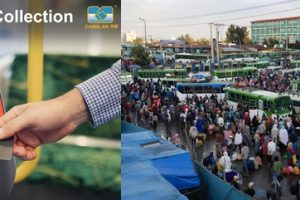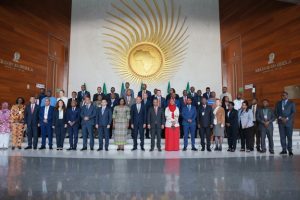
BY HAFTU GEBREZGABIHER
Samson Tesfaye (Dr), Senior Program Manager at Orbis International has been in the role for the last nine years. He is medical doctor with public health background. Orbis’s Cybersight program is a telehealth portal developed by Orbis International and its partners, he says during an exclusive interview with The Ethiopian Herald.
The main reason for the development of this portal is because of it’s easily scalability so that one can scale it up in any setup where he/she can have a 2G connectivity. It doesn’t need that much sophisticated applications, it runs in any browser, according to the senior official.
Accordingly, Cybersight has four key functions. The first function is consult. Initially, Cybersight was initiated for providing mentorship for local eye doctors (ophthalmologists). Meaning local doctors will be linked with the Cybersight system with renowned subspecialist on the field under discussion and they will have a one-on-one discussion on the case they have.
The second functionality is the ‘Learn functionality’. Learn means, anyone with Cybersight account can enjoy online courses at his/her own pace. There are many topics including in ophthalmology, nursing, biomed, optometrists and anesthesia to choose from. There are also range of surgical videos, records, lectures and textbooks, so this is the learn functionality of Cybersight.
The third functionality of Cybersight is the live teaching. This is where there is direct interaction and discussion with the expert from one point of the world, it could be in the US to everywhere. This also means while somebody in one part of the world is doing the surgery, someone assigned to him will be guiding him/her sitting in other tip of the world in real time.
The fourth and the latest one is the artificial intelligence (AI) functionality of Cybersight. This is the most recently added functionality for Cybersight, it means that someone can take a picture of an eye of a patient, upload it to the AI system in the Cybersight, then the artificial intelligence will compare that picture to what is existing within the database of the Cybersight, then it’ll provide with a possible diagnosis. This artificial intelligence currently is working for two kinds of conditions, namely glaucoma and diabetic retinopathy.
The dream for Orbis International Ethiopia is to nurture local experts and to be self-sufficient in providing mentorship support with local experts. Meaning the best eye doctors that are currently available only in the megacities in Ethiopia would be providing a mentoring service to a professional located in a corner of a rural part of Ethiopia.
As a pioneer organization, Orbis International has developed Cybersight program to support training, mentorship, as well as consultation. Using this online platform, anyone who is interested in the online trainings, there are massive resources for ophthalmology, as well as for other allied care workforce. It’s a very structured training, which involves not only just lectures, but also examinations and assessments. So people can access trainings all over the world. That’s true also for Ethiopian professionals, says Senior Program Director at Orbis International Ethiopia, Dawit Seyoum.
It is important to provide a little bit of background, what Cybersight is to the readers of The Ethiopian Herald so that they could easily get and understand what Orbis International’s has been doing to fight the causes of blindness in Ethiopia.
Orbis is an international NGO that transforms lives through the prevention and treatment of blindness. So, we are partnering with government and other partners in terms of blindness prevention as well as addressing visual impairment. There are actually three major causes of visual impairment in Ethiopia. Number one is cataract which requires surgical intervention. And number two is trachoma which can be addressed by strategical safety strategy and the third one is refractive error.
Those three causes of blindness require some level of expert interventions. “I think given that we are over 100 million populations, and we have a limited number of eye health professionals. We have fewer ophthalmologists, optometrists; we have limited number of ophthalmic nurses. So part of this is related with our training capacity. Orbis provides that there is some transformation in terms of use of technology for training and intervention.
Orbis Volunteering experts can provide a mentorship for ophthalmologists or for any allied health care worker who has faced challenges in terms of diagnosis and treatment of any condition. So Cybersight is a platform for professional development as long as there is a massive capability for uploading video as well as a photo of a case for instance, if an ophthalmologist or an allied eye care worker has something they’re going to stay stable and is not able to identify like that disease or any next steps, just take and upload the picture and can get professional consultation like from senior ophthalmologist in the country or outside. It is a platform really about just maximizing the current technological advancement for eye care work.
The future is about digital technologies, says Samson. One unique feature of eye care is it is technology intensive and most of the eye care interventions involve microsurgery. That means they are very much technology oriented. Unfortunately, most of the ophthalmic items and the technology are not easily locally available. Of course, that’s why, like the equipment, instruments and supplies are very expensive. So currently, there are a number of researches supported by the Cybersight, like for instance, efforts on artificial intelligence. In artificial intelligence, people who are on training can do simulation surgeries or simulation interventions before they start live surgery.
“Any eye-care worker who is intended to get training on surgical interventions for three cases, they do their first surgeries on simulation. So Cybersight is a very great space for simulation trainings. We move forward towards like investing in artificial intelligence, and maximizing Cybersight for those kinds of trainings.”
The other thing is about skill transfer says the Senior Program Director adding that anyone who is getting training on courses on Cybersight is generally attending the latest training on the ophthalmology field. So like the kind of training offer on Cybersight, for Latin America, for China, for the United States or for Ethiopia, except in some cases, the difference in terms of the language being offered by the Cybersight, there’s also a capability to offer training in multiple language integrating it with artificial intelligence.
Using Cybersight will continue to expand training opportunities for Ethiopian eye care workers, then for those who are interested in health education, generally, it is also just expanding opportunity of a global standard.
Furthermore, Cybersight is about engaging every health professional, all cadres and updating their knowledge so they can get the most recent information.
THE ETHIOPIAN HERALD FRIDAY 15 JULY 2022





